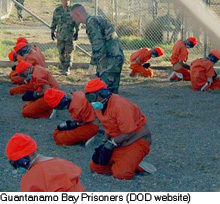Last week, in one of its first moves, the Obama administration told its military prosecutors to ask for delays in the proceedings of 21 Guantanamo detainees who have been charged, so that their cases, and the military commissions process as a whole, could be reviewed.
Most military judges have complied with that request. But one judge, Army Colonel James Pohl, has now declined to do so, saying he found the government's reasoning "unpersuasive," reports the Washington Post.
Pohl wrote:
The Commission is unaware of how conducting an arraignment would preclude any option by the administration. Congress passed the military commissions act, which remains in effect. The Commission is bound by the law as it currently exists, not as it may change in the future.
Pohl is presiding over the case of Abd al Rahim al-Nashiri, a Saudi citizen of Yemeni descent accused of planning the October 2000 Al Qaeda attack on the USS Cole warship, which killed 17 service members.
The Pentagon may now be forced to withdraw the charges against Nashiri if it wants to impose the broader delay. It could bring them up again, but that would bring the case back to square one, costing the government time.
But the wider impact of Pohl's opinion isn't yet clear. It may be limited to this specific case, but it could also potentially throw a wrench into the new administration's plan to put the process on hold pending a review, and even complicate Obama's plan to close Guantanamo.
We'll keep you posted as things become clearer.
Late Update: The ACLU has called on Defense Secretary Robert Gates to withdraw the charges against Nashiri so that the charges can be tried in a legitimate court. In a statement, the group's executive director, Anthony Romero, said:
Judge Pohl's decision to unabashedly move forward in the al-Nashiri military commission case shows how officials held over from the Bush administration are exploiting ambiguities in President Obama's executive order as a strategy to undercut the president's unequivocal promise to shut down Guantánamo and end the military commissions. Judge Pohl's decision to move forward despite a clear statement from the president also raises questions about Secretary of Defense Gates - is he the 'new Gates' or is he the same old Gates under a new president? Secretary Gates has the power to stop the military commissions and ought to follow his new boss' directives.
Later Update: But the commander of the USS Cole, Kirk Lippold, who is now affiliated with Military Families United, a group that bills itself as a "the nation's premier military family advocacy organization", takes the opposite view. Lippold said in a statement:
Today's decision is a victory for the 17 families of the sailors who lost their lives on the USS Cole over eight years ago. This trial is a long overdue step toward accountability and justice for the attacks on the USS Cole. The seventeen American sailors who lost their lives on October 12, 2000, when we came under suicide terrorist attack by al Qaeda, were not just sailors. They were sons and daughters, husbands and wives, and friends to so many. The sacrifice of these sailors and all of our brave military service members who have died to protect this country and apprehend terrorists is a key reason why we should not close the detention facility at Guantanamo Bay precipitously.
By President Obama signing the executive order to close Guantanamo Bay within a year, he is not considering or addressing the impact on the families who have paid so dearly to defend our freedom.













 Gitmo Prosecutor Quits Over Lack of Due Process
Gitmo Prosecutor Quits Over Lack of Due Process BREAKING: Hamdan Convicted
BREAKING: Hamdan Convicted Mukasey: Gitmo Detainees are Coming for Your Children
Mukasey: Gitmo Detainees are Coming for Your Children Attorney General's Call to Legislate Detainee Policy Rankles Senators
Attorney General's Call to Legislate Detainee Policy Rankles Senators Ashcroft: Sometimes I Confuse What People Tell Me With Reality
Ashcroft: Sometimes I Confuse What People Tell Me With Reality Feith Denies, Denies, Denies
Feith Denies, Denies, Denies New Book Reveals Existence of Secret Red Cross Torture Report
New Book Reveals Existence of Secret Red Cross Torture Report U.S. Blocks Payments To ACLU Attorneys Working At Guantanamo Bay
U.S. Blocks Payments To ACLU Attorneys Working At Guantanamo Bay Army Gets Defensive about Gitmo Judge's Removal
Army Gets Defensive about Gitmo Judge's Removal


